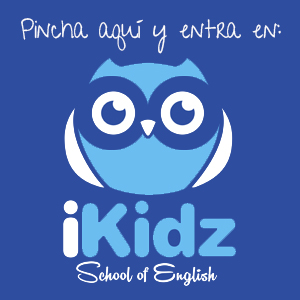 Do not tell me you've never experienced this situation: you get to talk to the typical companion profession that only uses acronyms to express. "What if the CLIL is the latest in language teaching, but you use CMC is that you're not the last ... " And you will look ojiplático saying: "Clear, Clear, If you say it…" Obviously I'm exaggerating a bit… Most English teachers are familiar with most of these acronyms, or more than from the acronym with the method to which they refer. But begins to have so many, we find it almost impossible to remember all of them and their meaning.
Do not tell me you've never experienced this situation: you get to talk to the typical companion profession that only uses acronyms to express. "What if the CLIL is the latest in language teaching, but you use CMC is that you're not the last ... " And you will look ojiplático saying: "Clear, Clear, If you say it…" Obviously I'm exaggerating a bit… Most English teachers are familiar with most of these acronyms, or more than from the acronym with the method to which they refer. But begins to have so many, we find it almost impossible to remember all of them and their meaning.
I was missing a little "directory" with the main acronyms refer to methodologies or tools used in language learning, namely English. That's why today I prepared a post with the main ones that I know and I've found researching a little.
Among the many acronyms associated with language teaching, I think it is essential that we organize depending on whether they refer to obtaining a degree, a methodology, etc.
Before getting into "divisions", all English teacher must know the meaning of the acronym CEFR, acronyms refer to Common European Framework of Reference for Languages, in Castilian Common European Framework of Reference for Languages: Learning, Teaching, Evaluation. Is a European standard, It used to measure the level of comprehension and oral and written expression in a given language.
Click here, you can see the diagram refers to the levels and tests according to the European Framework.
General concepts
- TESOL. Teachers of English to Speakers of Other Languages. Further, TESOL is an international organization for teachers who teach English as a second language. Within the TESOL, and specific courses have titles like DipTESOL (Trinity Diploma in TESOL) and CertTESOL (Trinity Certificate in TESOL) Both courses can be taken at Trinity College.
- TEFL. Teaching English as a Foreign Language. Often you will find these acronyms related to the above. These acronyms are often used to refer to teaching English in countries where this is not the first language.
- TESL. Teaching English as a Second Language. They are the acronyms used to talk about teaching English in countries where this is the first language. Obviously, usually students whose first language is not English. They are generally focused on immigrant programs and where immersion in the language is produced almost entirely.
- EAP. These are the abbreviations used to refer to English for Academic Purposes. Such programs prepare students to pass exams like IELTS or TOEFL.
- EFL o English as a Foreign Language, He refers to teaching English to students whose first language is not.
- ELT. These acronyms are similar to the above meaning and refer to English Language Teaching. Basically, teaching English to speakers of other languages.
- ESL It is short for English as a Second Language. Often it used especially in Australia, Canada and the United States to refer to teaching English to non-native.
- EAL. English as an Additional Language. These acronyms are also commonly used to refer to students who are learning English as an additional language.
titrations
Cambridge exams.
- ESOL. Stands used to refer to English for Speakers of Other Languages, Or what is the same, to refer to diplomas issued by the University of Cambridge, evaluating English proficiency of non-native.
- FELL OFF. These abbreviations are used to refer to Key English Test. It is the simplest of all Cambridge exams. Suitable for level A2 (elemental) approximately.
- PET. Preliminary English Test. Would be the next test after the KET Cambridge. It is recommended for students with an intermediate level, B1 approximately one.
- FCE. Surely with these acronyms these more familiar. The First Certificate in English, It is one of the most popular exams in most jobs. In theory, It is associated with a high average control language. B2 approximately.
- FALLS OFF. The Certificate in Advanced English It refers to an advanced language proficiency. C1 corresponds to a level approximately.
- CPE. Stands used to refer to Certificate of Proficiency in English. The title of Cambridge for the most advanced level.
- CELTIC. These acronyms refer to a very interesting option for those wanting to enter the profession of English teacher, but do not have a previous degree. Certificate in Teaching English to Speakers of Other Languages also has many "variants" depending on the work to develop, click here, you can access all available options.
Obviously, in Cambridge Inglés, There are many other titles ranging from Business English, such as ICFE (International Certificate in Financial English), which in fact it will retire from December 2016; to English for specific subjects such as medicine and health. I will not go into detail each of these because I believe that this post would be eternal 😉
- IELTS o International English Language Testing System. It is one of the most demanding tests in the world. It is an exam, unlike the tests we have discussed before, It has a limited effect, 2 years old. Some colleges ask for a certain level in this test as a requirement for access. Like many countries that require visas candidates who prove their English with this test.
- TOEFL o Test Of English as a Foreign Language. It is the American "brother" of IELTS, more common among British centers. Is an almost fundamental review if you want to enter a university in Australia, Canada the United States.
Learning methods
- CLIL. Surely you've heard of this method but, Have clear what? First it is important to be clear about the meaning of these acronyms. CLIL refers to Content and Language Integrated Learning. CLIL in Castilian known as AICLE (Content and language integrated learning). As defined by Navés and Muñoz, 2000, this method would "Studying subjects such as history or natural science in a language other than their own. AICLE is very beneficial for both the learning of other languages (French, english,…) as for the subjects taught in those languages. AICLE emphasis on "problem solving" and "know how things" makes students feel motivated to be able to solve problems and make things even in other languages. "
- CLT. These abbreviations are used to refer to Communicative Language Teaching, teaching approach which is fundamental interaction with the environment as the ultimate goal in learning a language.
- TPR. Total Physical Response. This is a method in which the teacher presents the vocabulary and structures you want to teach in a context of commands and actions. Games such as, “Simon says”.
Learning methods through new technologies.
- CALL. With the advent of new technologies to language teaching, They could not miss the methodologies referring to learning English. CALL stands used to talk about Computer-assisted language learning. CALL is a method It focuses a lot on the student's role, and allow these to learn on your own. CALL terms as others emerged later as CMC (Computer-Mediated Communication) the MALL (Mobile-Assisted Language Learning).
- CALI. Computer-assisted language instruction. Before the arrival of the term this term arose CALL. CALI was replaced by CALL CALI because apparently it focused more on the teacher's role rather than that of the student.
- SILL o Strategy Inventory for Language Learning, is a questionnaire developed by Rebecca Oxford. this instrument, used to collect information from students, It is also often used to collect and analyze information on studies correlating strategies using variables such as learning styles, gender, level of competition and culture.
- mooc. acronym Massive Open Online Course. It is a term with which you are very familiar and safe commonly used to refer to the online courses developed openly and massive.
I hope this post helps you understand a little better the lot of acronyms we use in our profession. Y, of course, If you know of any that I have gone I'll be happy to include 😉
Thanks for being there!
"Language is the roadmap of a culture. It tells you where its people come from and where it goes. "
Rita Mae Brown
Tags: acronym, Learn, Cambridge exams, CLIL, Languages, IELTS, english, learning methods, mooc, new technologies, means, acronym, TOEFL


 Español
Español English
English Français
Français Deutsch
Deutsch 中文(简体)
中文(简体) Português
Português

NICE INFORMATION
Thanks!!
well thank you so much but want to know more about it such as lexical approach
Hi Luis!
What would you like to know?
Regards,
Cristina
gracias for the invaluable info
sig have no idea?
Hi Juli,
We would have to see in what context, but surely means “special interest group”.
A hug,
Cristina
hi I´d like to know the grades of the TOEFL test, ´cause i took it in 1982 and I lost the results of it, please let me know if you know how can get this info,
Thanks
Regards
Zoraya
Hi Zoraya,
Here you can find the info you are looking for: https://www.ets.org/es/toefl/ibt/scores
Let me know if you need anything else.
Regards,
Cristina
Thank you very much Christina, this is just what I was looking for!!!
Ohh, I just saw that Cristina is not h, sorry for the mistake.
No problem Caesar! 🙂
Great!! 🙂
Let me know if you need anything else.
Regards,
Cristina